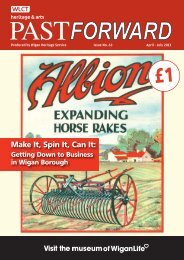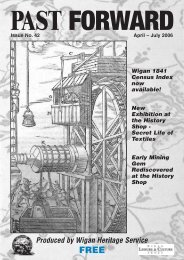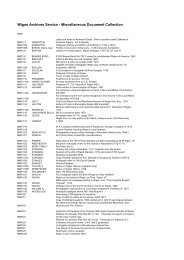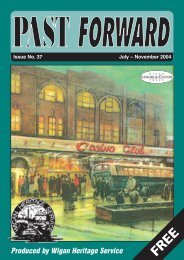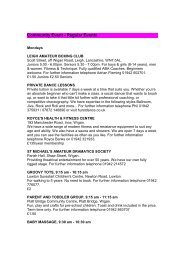A Royal Celebration - Wigan Leisure and Culture Trust
A Royal Celebration - Wigan Leisure and Culture Trust
A Royal Celebration - Wigan Leisure and Culture Trust
Create successful ePaper yourself
Turn your PDF publications into a flip-book with our unique Google optimized e-Paper software.
were only about three or four boys in St George’s<br />
school who wore ordinary shoes. They were at a<br />
distinct disadvantage during games lessons as<br />
none of us could afford football boots <strong>and</strong><br />
football <strong>and</strong> rugby (League of course) was played<br />
in clogs. On the other h<strong>and</strong> I seem to remember<br />
that those who wore shoes for some reason were<br />
always the ones who were selected to play the<br />
drums in the b<strong>and</strong>. I was always given a triangle,<br />
except on the odd occasion when I was chosen to<br />
play a clapper. Do I suspect here that a class<br />
system was in operation at St George’s?<br />
As I got older I remember mastering the art of<br />
attaching new clog irons. The irons were readily<br />
available from clog shops <strong>and</strong> it was cheaper to<br />
fix your own. You only had to prize off the old<br />
irons with a claw hammer, fill in the nail holes<br />
with matchsticks <strong>and</strong> then nail on the new ones.<br />
It was important, as winter approached, that you<br />
fitted new irons in good time as these didn’t<br />
slide very well <strong>and</strong> needed to be run-in. On the<br />
other h<strong>and</strong> if you let them wear too much they<br />
would break, making walking very difficult<br />
with a tendency to trip you up. Excessive wear<br />
<strong>and</strong> broken irons were often caused by kicking<br />
sparks – great fun but not recommended if you<br />
didn’t want the proverbial ‘clout round the<br />
earhole’ off your Dad.<br />
A clogger’s shop in Astley, circa 1910.<br />
Wearing in of new clogs was possibly one of the<br />
more painful experiences in life as, unlike the<br />
modern items worn today by clog dancers, the<br />
leather was extremely thick <strong>and</strong> took a long time<br />
to soften up. A few boys I remember avoided the<br />
painful experience of breaking in new clogs by<br />
having clog soles nailed to the soft leather uppers<br />
of worn-out boots, known as having your boots<br />
‘clogged’. Unfortunately, wearing these didn’t do<br />
a lot of good for your ‘street cred’.<br />
An even more painful experience was to have a<br />
clog sole break. This meant that every time you<br />
put your foot down the two halves closed up <strong>and</strong><br />
gave the sole of your foot a nasty nip. A poignant<br />
line in an old Lancashire dialect song goes “Mi<br />
clogs are boo-oth brokken, shoon ah’ve getten<br />
none, tha’d hardly gi mi tuppence for all ah’ve<br />
getten on.”<br />
It’s impossible to talk about clogs without<br />
mentioning the noise created by a large group of<br />
people wearing them. I used to live close to a<br />
junction of several streets where every morning<br />
people from lots of other streets converged on<br />
their way to the mills <strong>and</strong> coal mines of <strong>Wigan</strong>. As<br />
a lifelong insomniac I can remember Lizzy<br />
‘t’knocker-up’ starting her rounds in the morning<br />
just as St Catherine’s clock struck four - I never did<br />
13



